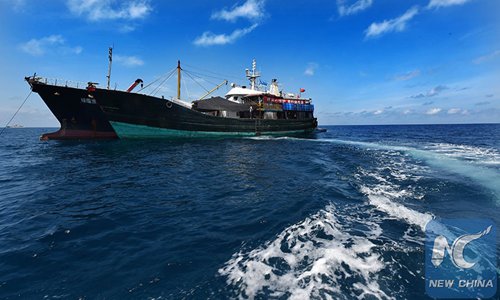US to fail to convince ASEAN nations to confront China on S.China Sea issue: experts
By Zhao Yusha and Cao Siqi Source: Globaltimes.cn Published: 2020/7/15 0:54:33

File photo taken on May 13, 2015 shows the workboat of a Chinese archaeological team for the archaeological work of the Shanhu Island No. 1 shipwreck in the Xisha archipelago in the South China Sea. Photo: Xinhua
The US attempt to convince ASEAN countries to go against China over the South China Sea issue will eventually turn into a "monodrama" and end up in failure, as Washington's global influence is receding and those countries see no interest in siding with the US and going against China, said observers on Tuesday.
They made the comments after Chinese State Councilor and Foreign Minister Wang Yi and Philippine Foreign Secretary Teodoro Locsin held a video meeting on Tuesday, in which both sides agreed on addressing the South China Sea issue through peaceful negotiations.
Wang expounded on China's principled position on the South China Sea issue, pointing out that with the joint efforts of China and ASEAN countries, the situation in the South China Sea has generally remained stable.
However, the US, out of geopolitical needs, keeps creating trouble in the region, said Wang, citing that it sends the most advanced warship to flex its muscle there, and pushes forward militarization of the South China Sea.
On Monday, US Secretary of State Mike Pompeo said that "Beijing's claims to offshore resources across most of the South China Sea are completely unlawful, as is its campaign of bullying to control them."
Wang noted that this dangerous trend deserves high vigilance from countries in the region, and the recent US statement regarding the South China Sea serves as a deliberate provocation of the relationship between China and ASEAN countries in an attempt to create conflicts and undermine regional stability.
Wang said to Locsin that on the maritime issue, we should look forward together to deal with it, not go back to the past.
Locsin said that Philippine-China relations are not all about the maritime dispute, and the bilateral ties won't be affected by such issue. The Philippines is willing to continue to work to resolve disputes in the South China Sea through friendly bilateral consultations, actively promote maritime cooperation, and jointly maintain peace and stability in the region.
The Philippines does not approve of certain countries using COVID-19 to target China, which is unfair and unreasonable, said Locsin, noting that Manila's support for the China-proposed Belt and Road Initiative will be unaffected.
The US statement followed a call issued on Sunday by Locsin for compliance with the arbitration ruling.
China has solemnly declared that the award is null and void and has no binding force. China neither accepts nor recognizes it. Beijing and Manila have reached consensus on shelving the decision of the South China Sea arbitration since the second half of 2016.
The Philippine statement has been deemed by Western media as a sign the Southeast Asian country is siding with Washington against China, but the illusion was soon broken by Locsin's statement on Tuesday.
The Philippines' attitude toward the South China Sea issue has always remained the same, which is to stand neutral and avoid taking sides, Chen Xiangmiao, an assistant research fellow at the National Institute for South China Sea Studies, told the Global Times.
He pointed out that the Philippines has benefited from the China-US rift in this region in the past years, and that choosing sides is actually against its interests.
Manila has always prioritized the overall situation of the South China Sea, and the region's development, as well as prosperity. It believes in addressing this issue through mutual negotiations and consultations, Chen said.
Observers said that the majority of ASEAN countries agree with the Philippines on US provocations, as they believe keeping the status quo is the best scenario for the development and prosperity of countries in the region.
US meddling in the South China Sea issue will eventually be just a "monodrama," and few countries will follow Washington to stand against China, as choosing sides between Beijing and Washington won't bring any good to those ASEAN countries, Chen said.
Washington will realize that, unlike before, its capacity to stir conflicts in the South China Sea region is diminishing, along with its global influence, said Wu Shicun, President of the National Institute for the South China Sea Studies, adding that few countries will publically announce support for the US.
Chinese President Xi Jinping said in a telephone conversation with Singaporean Prime Minister Lee Hsien Loong on Tuesday that cooperation between China and Singapore in the fight against COVID-19 has become a new highlight of bilateral relations, and added significant connotations to their all-round cooperative partnership.
Xi also said Tuesday in a telephone conversation with Thai Prime Minister Prayut Chan-o-cha that China stands ready to work with Thailand to cement solidarity and cooperation among regional countries, and safeguard the sound momentum of development and prosperity in the region.
Chen said Xi's phone calls with leaders of two of the most important ASEAN countries clearly send a signal to the US that China's relations with countries in this region are not as fragile as Washington has imagined.
Singapore is dubbed a "strategist" in the region, and as Lee has said publicly, ASEAN countries do not wish to take sides between China and the US, which basically lays the direction for ASEAN countries' stance between the two superpowers, Chen said
Posted in: DIPLOMACY